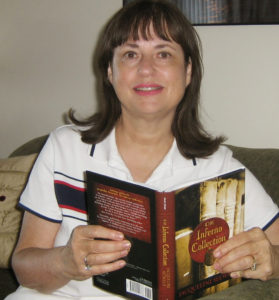 by Jacqueline Seewald, reprinted with permission
by Jacqueline Seewald, reprinted with permission
I’ve written well over a hundred original short stories, most of which have sold to paying markets and some of which have also sold as reprints. Therefore, I feel justified in offering some suggestions that might make life a bit easier for fellow short-story writers, particularly newbies.
Tip One:
You can approach writing a short story to sell to a fiction market two ways. You may write for a specific publication, following their guidelines and requirements, or you can write the story you want to write and then look for a market that is appropriate. I suggest the latter choice, unless an editor specifically invites you to submit your work for a themed anthology or magazine issue. Of course, if you aren’t certain what to write about, then publications requiring a particular theme might provide the answer for you. It’s also one way of dealing with writer’s block.
Tip Two:
You’re unlikely to sell short stories unless you’ve read a great many of them. This will give you an instinctive grasp of the genre. If you don’t enjoy reading short stories, you shouldn’t bother writing them. It will show.
Tip Three:
Don’t assume that because short stories are brief, they’re easy to write. In reality, it takes discipline to write a good short story and sheer brilliance to write a great one. Short stories are focused works of fiction, just as Poe explained.
“A short story must have a single mood and every sentence must build towards it.” ― Edgar Allan Poe
Tip Four:
You need to decide the type of short fiction you intend to write. Do you love literary short stories? Then write one of your own. Are you into speculative fiction? Do you enjoy science fiction, horror, or fantasy? Are you a mystery writer? Read some of the best, both past and present, before you attempt your own; however, be aware that each genre has its own type of content and style. Mashups are acceptable, but know the rules of each genre before you attempt to mix them. Do the research before you start to write. Read a lot of what you intend to write.
Tip Five:
Whether writing short fiction or a novel, you need to consider the basics: plot, setting, characters, and theme. Analyze how they fit together in your story. One hint: limit the number of characters to just a few in order to develop each one properly. Again, you need to focus.
Tip Six:
Also consider point of view. For instance, who tells the story? Will this story work best in first or third person? Why? Is the narrator sophisticated, jaded, innocent, naïve? The style and choice of language need to reflect these considerations.
Tip Seven:
When you finish writing your story, put it away for a while and go on to another project. Wait at least one month, then reread and revise as needed. You’re now the editor and must view your work with a critical eye. You will see the need for change and improvement.
Tip Eight:
When you’re ready to submit your story for publication, carefully read the submission guidelines. You have to follow them exactly. Each market has its own unique requirements.
Tip Nine:
Avoid writing only for exposure. Some paying markets encourage beginners without publishing credits. When they offer you a contract, read it over carefully before signing. You can negotiate to some extent; for example, avoid agreeing to sell all rights. Ask for first rights only. This leaves you free to sell reprint rights when your work is out of print.
Tip Ten:
Don’t be afraid to try writing in more than one genre or style. The great thing about short-story writing is that you can experiment. It’s not as constrained as novel writing. I have gotten stories published in a variety of genres: literary, mystery, romance, science fiction, fantasy, and even horror—although I admit my horror stories are more psychological than gory. You really don’t know what you are capable of doing best until you’ve tried many styles of writing.
Wishing all fellow writers much success!
Multiple-award-winning author, Jacqueline Seewald, taught creative, expository, and technical writing at Rutgers University, as well as high school English. She also worked as an academic librarian and an educational media specialist. Nineteen of her books of fiction received critical praise, including books for adults, teens, and children. Her most recent novels are Death Promise and Witch Wish. Her short stories, poems, essays, reviews, and articles have appeared in hundreds of diverse publications and numerous anthologies: The Writer, L.A. Times, Reader’s Digest, Pedestal, Sherlock Holmes Mystery Magazine, Over My Dead Body!, Gumshoe Review, Library Journal, Publishers Weekly and The Christian Science Monitor.
